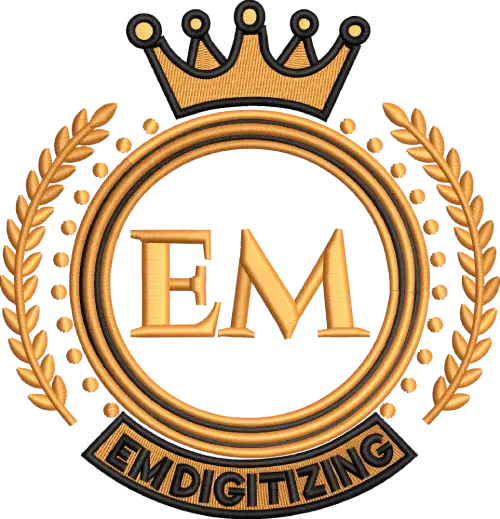Diseño de diseños de bordados FSL (Encaje independiente) te permite crear intrincado, Patrones sin telas que mantienen su forma maravillosamente. Si eres un principiante o tienes algo de experiencia en bordados, Aprender a digitalizar para FSL puede transformar sus diseños en elegantes encajes.
La clave está en los detalles: los tipos de puntadas correctas, secuenciación reflexiva, y los estabilizadores adecuados juegan un papel en el creación de encajes que son resistentes y delicados. Esta guía lo guiará en cada paso., haciendo que sea sencillo dar vida a sus ideas de encaje.
Listo para explorar el arte de la digitalización FSL? Empecemos!
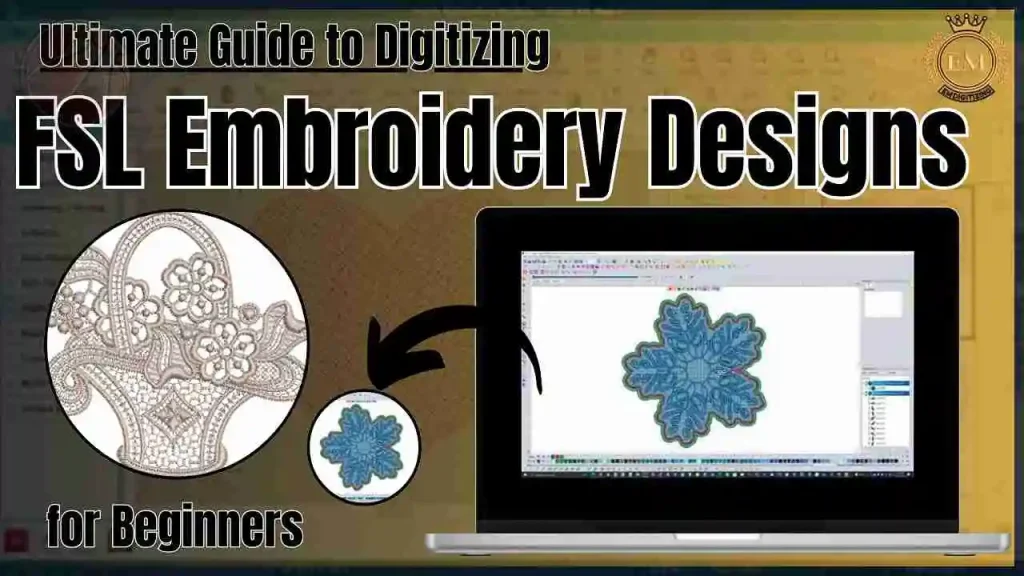
Guía definitiva para digitalizar diseños de bordado FSL para principiantes
Software esencial para digitalizar diseños de bordados FSL
Creando encaje FSL intrincado y duradero diseños de bordado Requiere software que pueda administrar el trabajo delicado en puntadas y proporcionar un control detallado sobre la densidad y la personalización.
Aquí hay cinco opciones de software principales para digitalizar FSL, cada una ofreciendo características únicas para elaborar hermosas, Diseños de encaje estables.
- Estudio de bordado Wilcom
- Software de bordado por sombreado
- Brother PE-Diseño
- Estudio Embird
- CoserArte
1. Estudio de bordado Wilcom
Westudio de bordado de ilcom es una opción líder para digitalizadores profesionales, conocido por sus herramientas avanzadas y precisión. Este software permite a los usuarios controlar todos los aspectos de la densidad y el tipo de puntadas, que es esencial para diseños FSL estables.
Sus herramientas específicas de encaje permiten la creación de patrones de encaje intrincados, haciéndolo ideal para diseños de bordado de máquina FSL complejos complejos. El software también ofrece una función de simulación que proporciona una vista previa realista del producto final, Asegurar que su diseño se vea perfecto antes de coser.
2. Software de bordado por sombreado
Desarrollado por Wilcom, Hatch es una opción versátil adecuada tanto para principiantes como para digitalizadores experimentados. Su interfaz intuitiva y su poderosa funcionalidad facilitan la creación de diseños FSL de calidad profesional.
Hatch ofrece varios tipos de puntadas personalizables, Especialmente aquellos adecuados para el encaje, y permite un control de densidad preciso. Con su facilidad de uso, Hatch es una opción superior para crear hermosa, Diseños duraderos de encaje FSL sin una curva de aprendizaje empinada.
3. Brother PE-Diseño
El hermano PE-Disign es un integral software de digitalización Ideal para usuarios con máquinas de bordado hermano. Ofrece una integración perfecta y permite a los usuarios crear y personalizar diseños FSL con facilidad.
El software incluye controles de densidad de puntadas, Permitir ajustes que aseguran la durabilidad de los encaje. Además, Las herramientas de simulación de PE-Design ayudan a obtener una vista previa de la durabilidad del diseño, haciéndolo una excelente opción para lograr un establo, encaje visualmente atractivo.
4. Estudio Embird
Embird Studio es una herramienta de digitalización flexible y potente específicamente optimizada para diseños de encaje FSL. Ofrece un módulo de encaje dedicado con herramientas para controlar la densidad de puntadas, tipo, y espaciado, Todo crítico para la estabilidad de encaje independiente.
Las capacidades de edición de Embird permiten una amplia personalización, haciéndolo ideal para diseñadores que desean experimentar con intrincados diseños FSL. Proporciona un equilibrado, Solución asequible con funcionalidad robusta, haciéndolo adecuado tanto para profesionales como para aficionados.
5. CoserArte
Sewart es un software fácil de usar diseñado para principiantes que buscan crear diseños FSL simples sin ajustes complejos. Ofrece características de digitalización básicas, Patrones automáticos de puntadas, y llenar opciones, que se puede usar para diseños de encaje sencillos.
Aunque Sewart puede carecer de personalización avanzada, Es una opción asequible y accesible para aquellos nuevos en la digitalización de FSL. Permite a los usuarios experimentar con diseños de encaje sin necesidad de un más complejo, Solución de software de alta gama.
Cómo digitalizar los diseños de bordados FSL en Wilcom
Digitalización de encaje independiente (FSL) Los diseños de bordado requieren una planificación cuidadosa y atención al detalle. Siga estos pasos para crear su propio diseño FSL estable y hermoso en Wilcom.
1. Configure su archivo de diseño
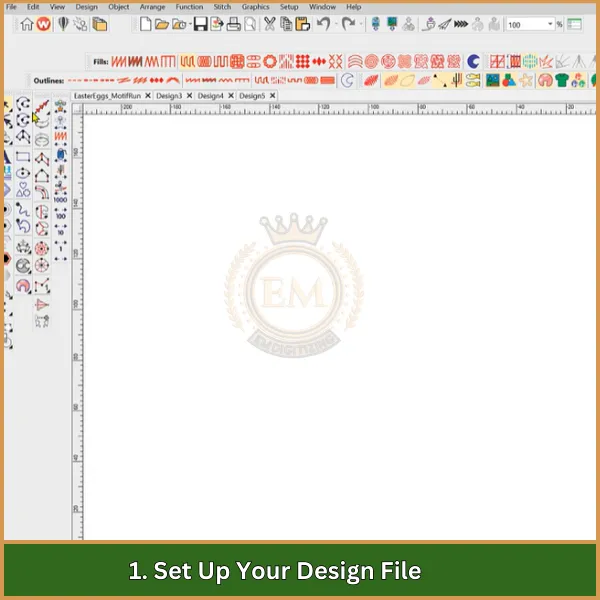
para empezar, Abra Wilcom e inicie un nuevo archivo de diseño. Configure el tamaño del lienzo y seleccione el tipo de aro que se ajuste a su diseño de encaje. Si está comenzando con diseños de bordado FSL gratuitos, Asegúrese de que sean compatibles con Wilcom y adecuado para la estructura de encaje. Esta configuración inicial asegura que su diseño se escalará adecuadamente y estable dentro del aro.
2. Crea el esquema de tu diseño de encaje
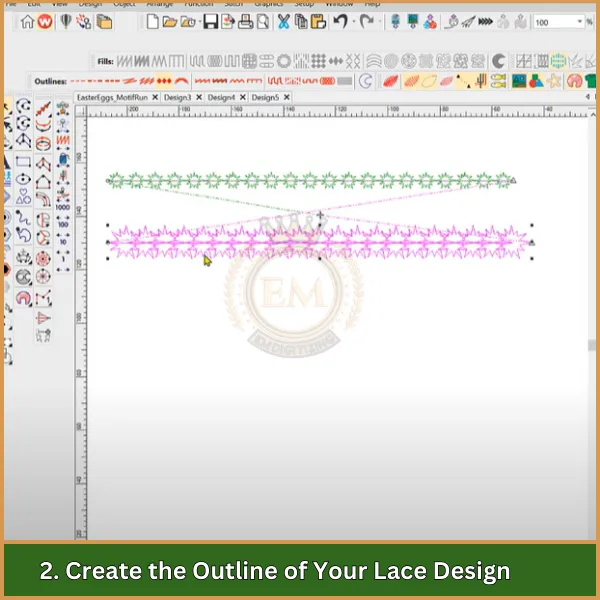
Uso de las herramientas de dibujo en Wilcom, describe la forma de tu diseño de encaje. Convierta este esquema en una puntada en ejecución o puntada de satén para establecer un marco sólido que le dará a su diseño de encaje la estructura que necesita mantener unida cuando se cose..
3. Elija los tipos de puntadas apropiados para el encaje
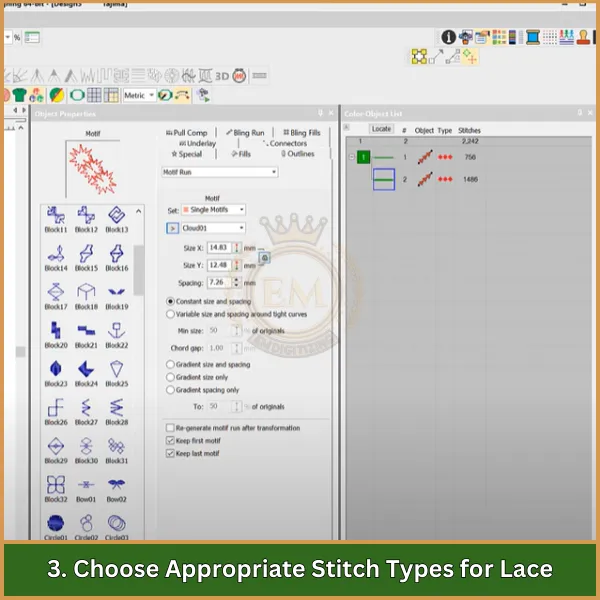
Seleccione los tipos de puntadas que le darán a su encaje un delicado, aspecto aireado mientras mantiene la estabilidad. Elija Puntadas de relleno como Tatami o Net Fills, que a menudo se usan para encaje a medida que crean un textura, patrón abierto. Ajuste la densidad de la puntada para garantizar que el encaje parezca ligero sin comprometer la resistencia.
4. Ajuste la configuración de puntadas para la estabilidad independiente
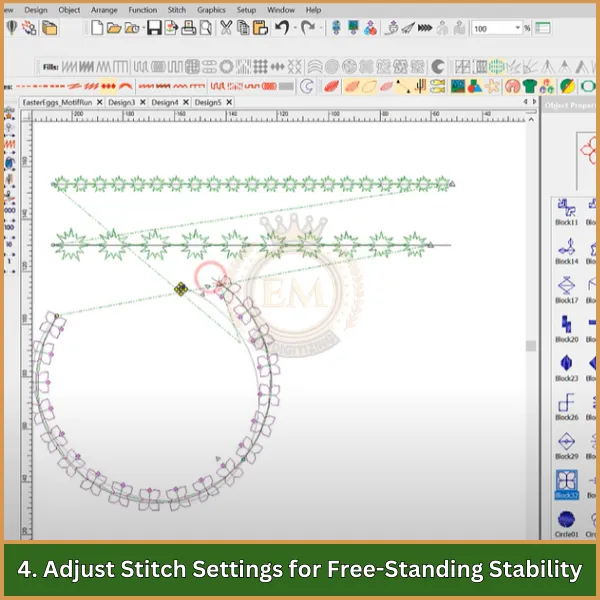
Establezca una puntada subyacente para proporcionar estabilidad adicional. Use una capa subyacente de luz como una ejecución de borde, que refuerza el diseño sin agregar densidad excesiva. Ajuste la configuración de tensión y densidad para evitar frunces y garantizar que el diseño de encaje mantenga su forma de forma independiente.
5. Prueba y refina tu diseño

Guarde su diseño y pruebe en un estabilizador soluble en agua para verificar los problemas. La costura de la prueba le permite observar cómo funciona el diseño de encaje y revela cualquier punto débil que pueda necesitar ajuste. Haga los cambios necesarios en Wilcom para mejorar la durabilidad del diseño.
6. Guardar y exportar el archivo de diseño
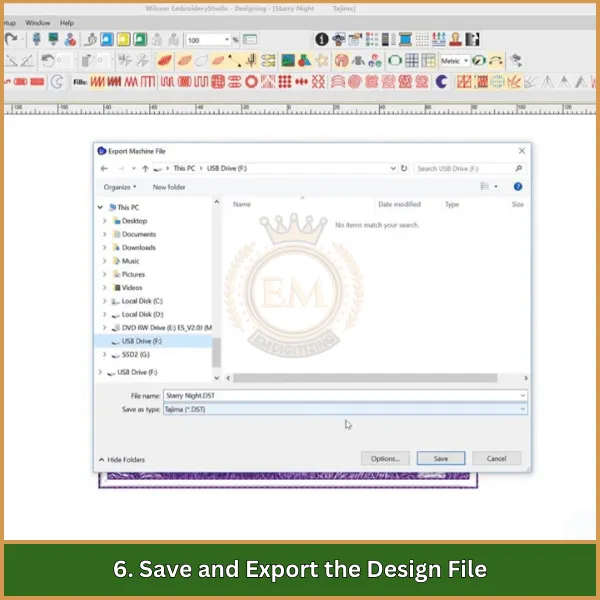
Una vez que esté satisfecho con el diseño, Guárdelo en el formato WILCOM para una fácil edición si es necesario. Después, Exportar el diseño en el formato de archivo compatible con su máquina de bordado, como DST o PES, y prepararlo para coser.
Consejos clave para perfeccionar diseños de bordados FSL
Lograr encaje independiente profesional (FSL) El bordado requiere una planificación y técnica cuidadosa. Aquí le mostramos cómo mejorar la belleza y la durabilidad de sus diseños FSL.:
- Planifique su pedido de puntada cuidadosamente: Organice su secuencia de puntada estratégicamente para reducir el exceso de adornos y puntadas de viaje, resultando en un diseño más limpio.
- Sigue un camino consistente de puntada: Trabajar metódicamente de un lado a otro, como de izquierda a derecha o de abajo hacia arriba, Para garantizar un flujo de trabajo suave y eficiente.
- Elija las herramientas de puntada correctas para curvas: Use la columna una herramienta para puntadas de satén, que son esenciales para crear el suave, Las líneas que fluyen que hacen que los diseños de encaje se vean sin problemas.
- Use puntadas de viaje ocultas: Aplicar puntadas de una sola carrera en otros elementos para evitar adornos visibles, mantener intacta la estructura de encaje.
- Vigile su orden de objeto de color: Verifique regularmente la lista de objetos de color para realizar un seguimiento del orden de diseño, Ayudando a mantener la organización y el flujo.
- Refinar con la herramienta de reintienda: Presione "H" para habilitar la herramienta de remodelación, permitiéndole ajustar los detalles y mejorar la precisión del diseño.
- Zoom para obtener detalles precisos: Use Zoom para colocar cuidadosamente nodos y alinear objetos con precisión, Especialmente importante para los delicados detalles en encaje.
- Establecer una densidad de puntada equilibrada: Ajuste la densidad de puntadas a una configuración más ligera para mantener el aspecto aireado del encaje mientras preserva la resistencia estructural.
- Ejecute una prueba de puntada de muestra: Pruebe su diseño en un material o estabilizador similar para atrapar cualquier problema potencial con estabilidad o apariencia antes de finalizar.
- Elija el estabilizador ideal: Un estabilizador de lavado de malla de fibra proporciona el soporte adecuado, Disolverse limpiamente después de coser para mantener la estructura de encaje.
Estos consejos lo ayudarán a producir diseños FSL que son elegantes y estructuralmente sólidos, Mostrar su experiencia y creatividad.
Conclusión
Si la digitalización de los diseños de bordado FSL se siente abrumador, don’;preocupación: la emdigitación está aquí para facilitarte! Nos especializamos en alta calidad, servicios de digitalización asequibles con un cambio rápido garantizado.
Obtendrá una vista previa de su diseño para asegurarse de que sea correcto, y para clientes por primera vez, Estamos entusiasmados de ofrecer un 50% descuento. Permítanos manejar los detalles para que pueda concentrarse en crear hermosos bordados. Comunicarse con EMDigitalización hoy, Y damos vida a tus diseños de encaje!
